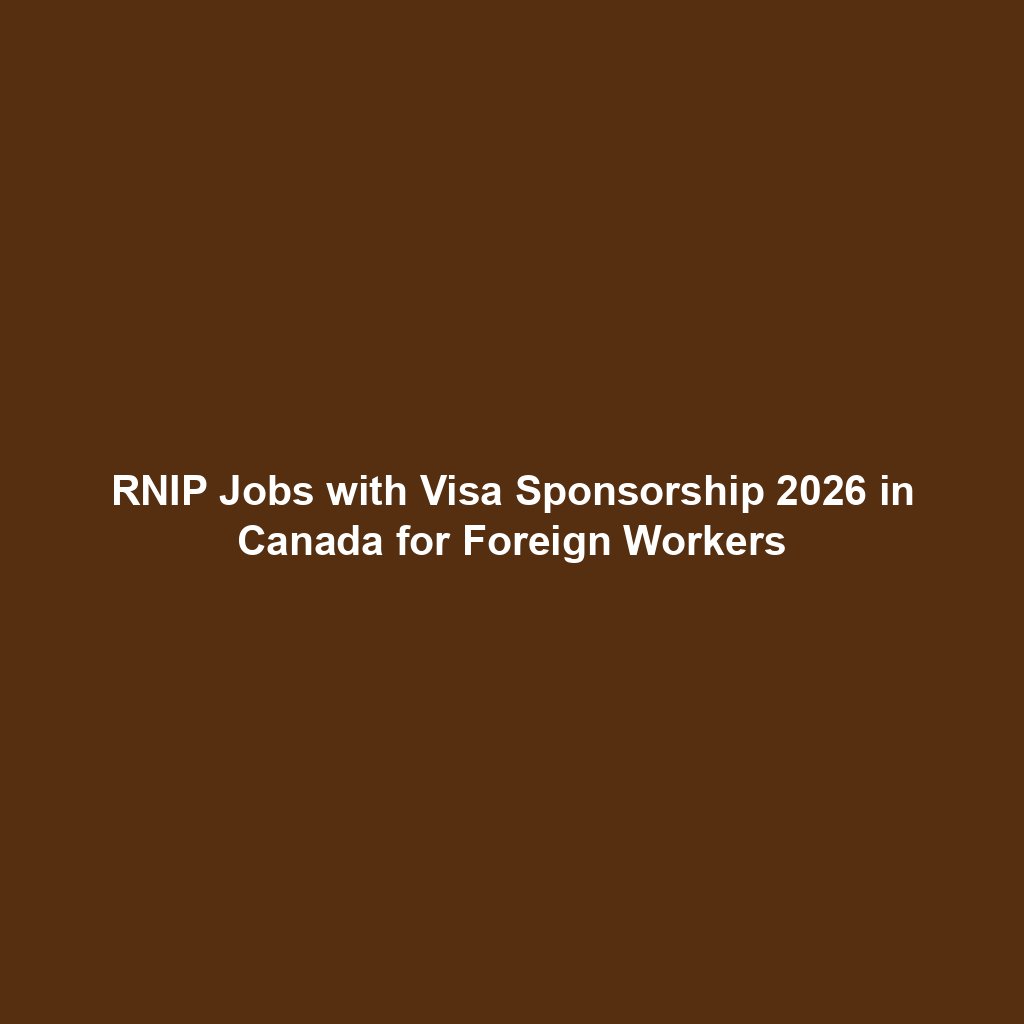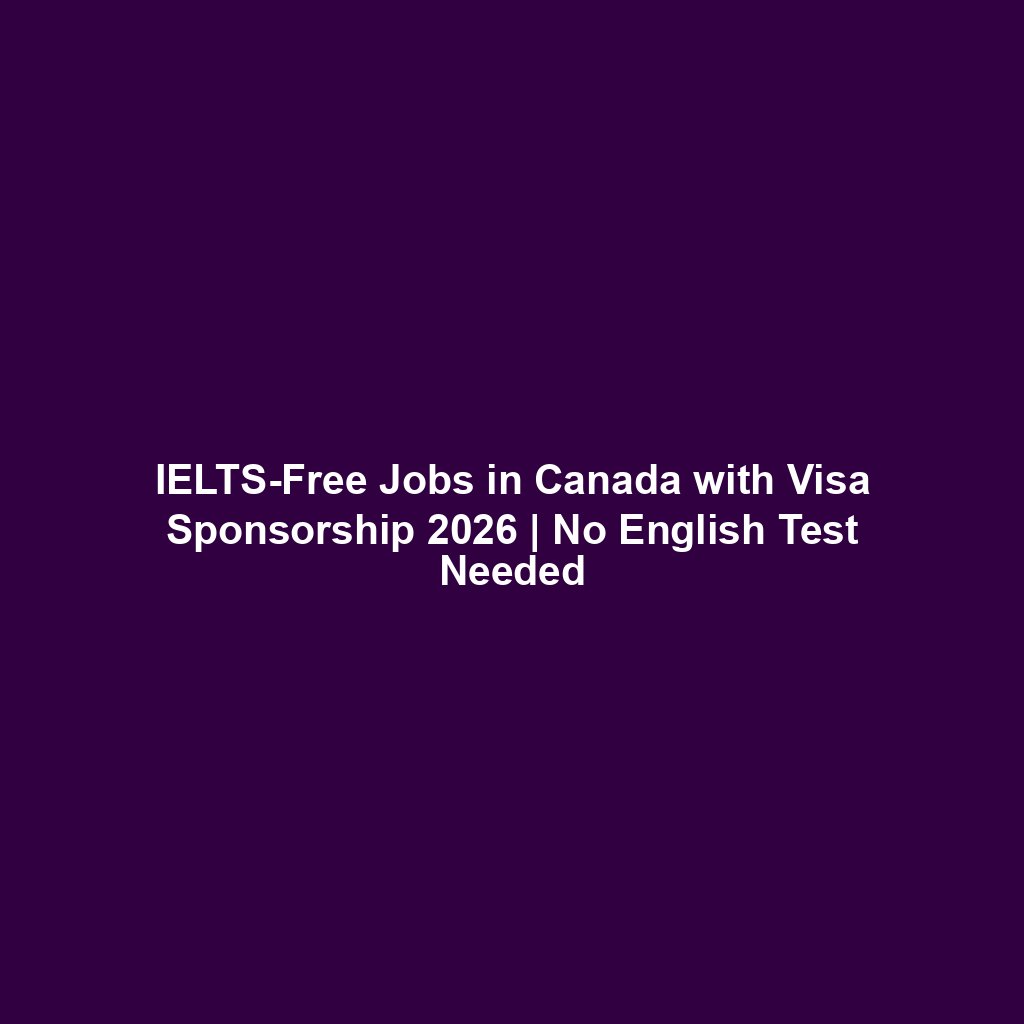Explore 2026 visa-sponsored jobs under Canada’s Rural and Northern Immigration Pilot (RNIP). Learn about in-demand occupations, participating communities, how to apply, and secure permanent residency through rural work opportunities.
Canada remains a top destination for immigrants seeking a better quality of life, career opportunities, and a stable future. While most newcomers head to major cities like Toronto or Vancouver, Canada’s smaller towns and rural communities are in dire need of workers to fill labour shortages and revitalize local economies.
To solve this problem, the Canadian government introduced the Rural and Northern Immigration Pilot (RNIP). This innovative program helps attract foreign workers to rural areas by offering permanent residency pathways tied to job offers in participating communities. What makes RNIP even more appealing is that visa sponsorship is provided by employers in collaboration with their local community authorities.
If you’re a foreign job seeker in 2026, this could be your golden ticket to move to Canada permanently—even without a university degree or extensive work history in Canada.
In this guide, we’ll break down the top visa-sponsored jobs under the RNIP for 2026, outline the application steps, and show you how to start your journey toward living and working in rural Canada.
Key Highlights
- 🌎 RNIP targets skilled and unskilled foreign workers for jobs in smaller Canadian communities.
- 📝 Job offer from a designated employer is required, but visa sponsorship is part of the package.
- 🏘️ Over 10 Canadian communities are currently participating in RNIP for 2026.
- 👨👩👧 The program offers a direct pathway to permanent residency.
- 📍 High demand for healthcare workers, food service staff, truck drivers, and farm laborers.
What is the Rural and Northern Immigration Pilot (RNIP)?
The RNIP is a community-driven immigration program that allows smaller and remote Canadian communities to attract foreign talent to fill labor shortages. It was launched to spread the benefits of economic immigration to areas that don’t usually see high numbers of immigrants.
Under RNIP, communities partner with local employers to offer jobs to foreign nationals. Once selected, the candidate receives a community recommendation, which supports their application for permanent residency (PR). In most cases, these employers also support your work visa sponsorship, allowing you to come to Canada before PR is finalized.
Unlike other immigration programs, RNIP focuses more on community integration, long-term settlement, and local labor demand rather than just academic credentials.
Participating Communities in 2026
As of 2026, the following communities are actively participating in the RNIP:
- North Bay, Ontario
- Sudbury, Ontario
- Timmins, Ontario
- Sault Ste. Marie, Ontario
- Thunder Bay, Ontario
- Brandon, Manitoba
- Altona/Rhineland, Manitoba
- Moose Jaw, Saskatchewan
- Vernon, British Columbia
- West Kootenay (Trail, Castlegar, Rossland, Nelson), British Columbia
- Claresholm, Alberta
Each community has its own list of approved occupations, employer requirements, and settlement plans.
📍 Visit the official RNIP page: https://www.canada.ca/en/immigration-refugees-citizenship/services/immigrate-canada/rural-northern-immigration-pilot.html
In-Demand Jobs Under RNIP with Visa Sponsorship (2026)
Below are some of the most common and high-demand job roles under RNIP in 2026. These vary by community, but most are willing to sponsor foreign workers.
1. Registered Nurses (RNs) & Healthcare Aides
Rural communities have critical shortages of healthcare professionals.
- Salary Range: CAD $55,000 – $85,000/year
- Top Locations: Sault Ste. Marie, North Bay, Moose Jaw
2. Truck Drivers (Class 1 & 3)
Long-haul and local truck driving roles are always in demand due to logistics needs.
- Salary Range: CAD $48,000 – $70,000/year
- Top Locations: Brandon, Thunder Bay, Altona
3. Retail Sales Associates & Supervisors
Retail remains one of the most stable sectors, especially in tourism-driven towns.
- Salary Range: CAD $30,000 – $50,000/year
- Top Locations: Vernon, Claresholm, West Kootenay
4. General Farm Workers & Meat Cutters
Farming and food processing are essential to rural economies.
- Salary Range: CAD $32,000 – $45,000/year
- Top Locations: Altona/Rhineland, Brandon, Timmins
5. Cooks and Food Counter Attendants
The hospitality industry in rural towns is always hiring entry-level food service staff.
- Salary Range: CAD $28,000 – $38,000/year
- Top Locations: Vernon, Moose Jaw, North Bay
6. Construction Labourers and Carpenters
Homebuilding, renovations, and public works projects fuel demand for construction workers.
- Salary Range: CAD $40,000 – $55,000/year
- Top Locations: Thunder Bay, West Kootenay, Sault Ste. Marie
7. Childcare Workers & Early Childhood Educators (ECEs)
Many rural communities offer employment for certified or experienced childcare staff.
- Salary Range: CAD $35,000 – $50,000/year
- Top Locations: Sudbury, Claresholm, Vernon
How to Apply for RNIP Jobs with Visa Sponsorship (2026)
Step 1: Check Eligibility Requirements
To qualify for RNIP, you must:
- Have a valid job offer from an employer in a participating community
- Meet minimum language requirements (CLB 4–6 depending on job)
- Meet educational requirements (usually a high school diploma or equivalent)
- Have relevant work experience (1 year minimum, in most cases)
- Demonstrate intent to live in the community
Note: You do not need Canadian work experience to qualify.
Step 2: Explore Jobs from Designated Employers
Each participating community maintains a list of eligible jobs from approved local employers. These are employers that can sponsor your work visa and support your PR application through a community recommendation.
Use these links to access job boards by region:
- Sault Ste. Marie RNIP Jobs
- North Bay RNIP Jobs
- Vernon RNIP Jobs
- Thunder Bay RNIP Jobs
- Moose Jaw RNIP Jobs
Filter for “open to international candidates” or “LMIA not required.”
Step 3: Apply for a Job Directly
Once you find a suitable job, submit your application with:
- A Canadian-style resume
- A tailored cover letter
- Proof of qualifications or work experience
- Language test results (IELTS/TEF)
If shortlisted, the employer will conduct an interview and, if successful, issue a job offer letter.
Step 4: Obtain a Community Recommendation
After securing a job offer, apply to the local RNIP office for a community recommendation. This process assesses your ties to the community, job alignment, and likelihood of settlement.
Each community has its own process and deadlines, so visit their individual RNIP portals.
Step 5: Apply for Permanent Residence
With the community recommendation, you can apply for PR through IRCC. Required documents include:
- Job offer
- Community recommendation
- Proof of language proficiency
- Medical exams and police certificates
- Application fee (CAD $1,365)
Apply online through the IRCC Portal
Step 6: Apply for Work Permit (Optional but Recommended)
If you want to move to Canada while your PR is being processed, your employer can help you apply for a temporary work permit, which allows you to begin working right away.
This also helps you integrate into the community early and speeds up settlement.
Benefits of RNIP Jobs for Immigrants
- ✅ Direct route to permanent residence
- ✅ Visa sponsorship from trusted Canadian employers
- ✅ Lower competition compared to urban programs
- ✅ Lower cost of living in rural areas
- ✅ High demand and job security
- ✅ Support from local community organizations for newcomers
Conclusion: Start Your Journey to Canada Through RNIP
The Rural and Northern Immigration Pilot (RNIP) is a game-changing opportunity for immigrants who want to live and work in Canada—especially those who may not qualify through traditional Express Entry streams.
In 2026, employers across rural Canada are offering visa-sponsored jobs with the chance to settle permanently. With simple eligibility, high demand for both skilled and unskilled workers, and the promise of permanent residency, now is the perfect time to apply.
📢 Don’t wait! Browse RNIP job listings today and take the first step toward building a new life in rural Canada.
FAQs
1. Do RNIP jobs offer visa sponsorship for foreign applicants?
Yes. Most employers under RNIP support visa applications by offering job offers and community-based endorsements.
2. Is it easier to get PR through RNIP than Express Entry?
For many applicants without high CRS scores, RNIP offers a more accessible pathway to permanent residency.
3. Do I need Canadian work experience to apply for RNIP?
No. As long as you meet the job requirements and have relevant work experience from abroad, you’re eligible.
4. What language test scores are required for RNIP?
Typically, CLB 4 to 6 depending on the occupation. IELTS or TEF results are accepted.
5. Can I bring my family with me through RNIP?
Yes. Once approved for PR, you can include your spouse and dependent children in your application.


